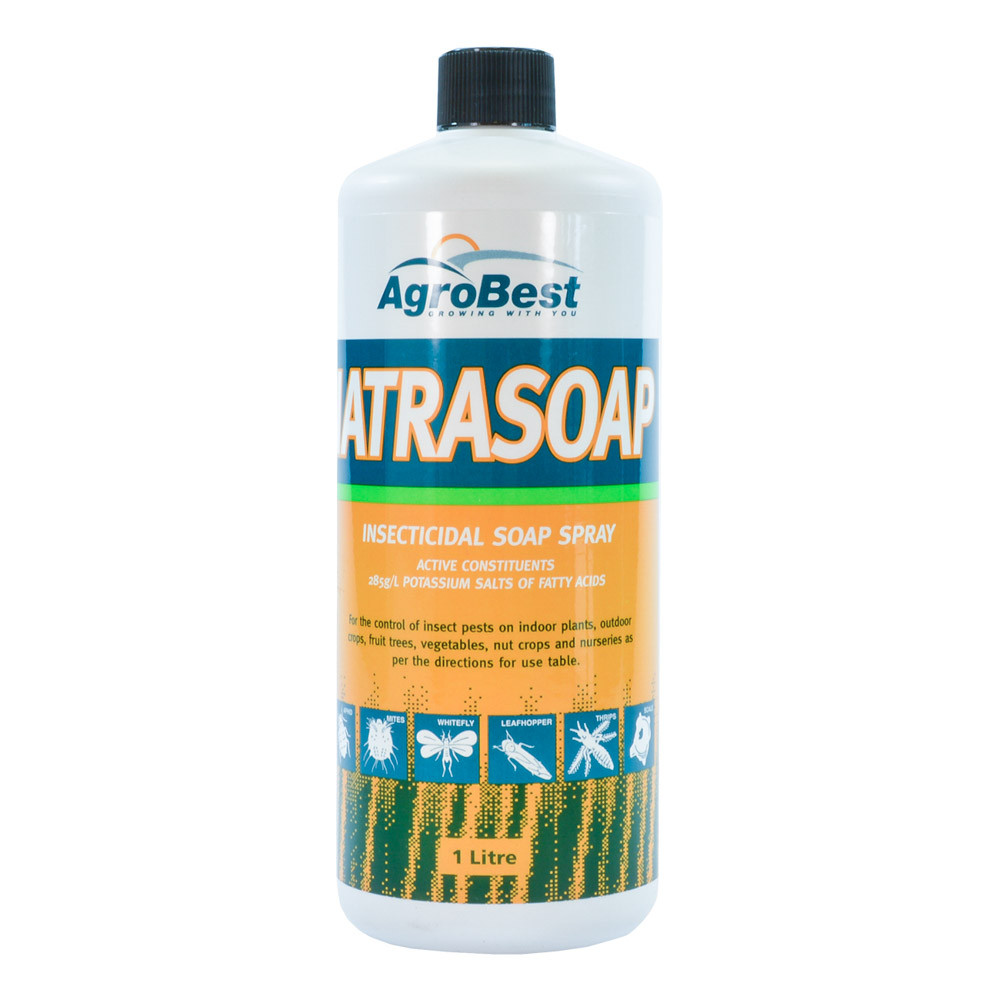Description
THIS PRODUCT: An organically registered contact insecticide for use against harmful soft-bodied insects and no withholding period. The ultimate pest management solution is tough on insects, and soft on the environment.
NatraSoap is a fast-acting organic contact insecticide, known to be highly effective against a wide range of soft-bodied pests such as:
- Aphid
- Thrips
- Mealybug
- Whitefly
- Leafhopper
- Two Spotted Mite
- Spider Mite
Can be used on a wide variety of outdoor crops, fruit trees, vegetables, nurseries, ornamentals, and hothouse plants. NatraSoap has no withholding period and is an Australian Organic Registered Farm Input for products that are used in organic farming or processing.
NatraSoap is a contact insecticide that requires good coverage for high efficacy. When direct contact with the pest occurs Natrasoap begins to break down the insect Trachea, once applied Natrasoap becomes surface-active allowing a different mode of action to reduce the potential for the development of pest resistance.
Enhanced pest control performance will be achieved by pre-mixing with SprayTech Oil. This will increase droplet deposition and retention resulting in improved rainfastness.
NatraSoap is considered a selective insecticide due to its minimal adverse effects on other beneficial insects, including bees and predatory mites.
In General: Insecticidal soap is a natural and environmentally friendly pesticide used to control a wide range of soft-bodied insect pests on plants. It is made from a combination of soap or detergent and water, often with the addition of other ingredients such as oils or fatty acids. Insecticidal soap works by disrupting the cell membranes of insects, leading to their dehydration and eventual death. Here’s a description of insecticidal soap and its common uses:
Description: Insecticidal soap is typically a liquid solution that is sprayed onto the foliage of plants infested with soft-bodied insects like aphids, mealybugs, spider mites, whiteflies, and certain types of caterpillars. Key features of insecticidal soap include:
- Non-Toxic: Insecticidal soap is considered safe for humans, pets, and beneficial insects when used as directed. It is less harmful to the environment compared to synthetic chemical pesticides.
- Targeted Action: It primarily affects soft-bodied insects, leaving beneficial insects like ladybugs, lacewings, and pollinators largely unharmed. This makes it suitable for integrated pest management (IPM) strategies.
- Mode of Action: The soap disrupts the insect’s cell membranes, causing cells to leak and leading to dehydration. This ultimately results in the death of the insect.
Uses:
- Gardening: Insecticidal soap is commonly used by gardeners to control insect pests on ornamental plants, vegetables, herbs, and fruit trees. It is particularly effective against aphids, which can be a common garden pest.
- Houseplants: Indoor houseplants are susceptible to pests like spider mites, mealybugs, and whiteflies. Insecticidal soap can be used to treat infestations on houseplants, helping to maintain their health.
- Greenhouses: In commercial and hobby greenhouses, insecticidal soap is used to control pests and maintain a pest-free environment for growing plants.
- Vegetable Gardens: Gardeners often use insecticidal soap on vegetable crops to prevent and manage infestations of aphids, thrips, and other soft-bodied pests.
- Integrated Pest Management (IPM): Insecticidal soap is an essential tool in IPM programs, which aim to reduce the need for synthetic chemical pesticides by using multiple pest control methods. It is used alongside practices like beneficial insect release and cultural controls.
- Orchards: Insecticidal soap can be used on fruit trees to control pests while minimizing chemical pesticide use, which can be harmful to pollinators.
- Organic Farming: Organic farmers use insecticidal soap as a natural pest control option that aligns with organic farming standards.
- Safe for Beneficial Insects: Insecticidal soap is less harmful to beneficial insects such as ladybugs, parasitoid wasps, and hoverflies, which are important for natural pest control in gardens and agricultural settings.
Overall: When using insecticidal soap, it’s important to follow the manufacturer’s instructions for dilution, application, and frequency. Ensure thorough coverage of the plant’s foliage, including the undersides of leaves where many pests congregate. Insecticidal soap is most effective when applied directly to the insects, so be vigilant in your application. Reapply as needed until the pest infestation is under control.


